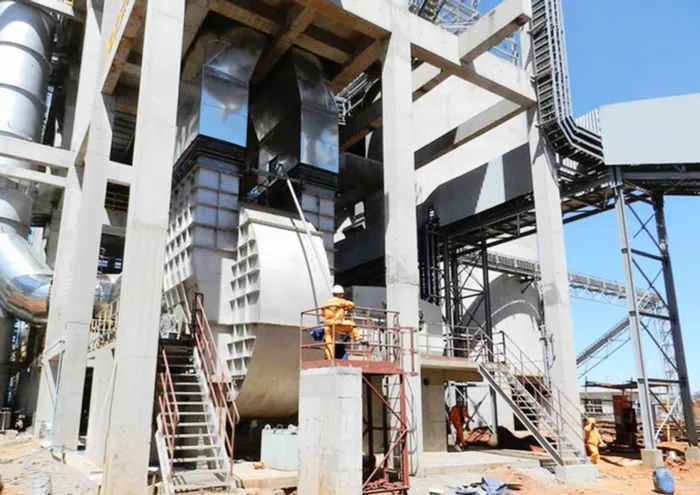Sephaku Holdings reports mixed results amid cautious optimism in construction sector
Cement

Sephaku Cement, an associate of Sephaku Holdings, operates this milling plant in Delmas.
Image: Supplied
Sephaku Holdings’ construction materials subsidiaries have not yet seen a material uplift in demand for construction materials, but the retail environment for bag sales has improved, said CEO Kenneth Capes on Friday.
In the six months to September 30, the group, which counts Sephaku Cement (SepCem) and Métier as its key investments, reported consolidated revenue increasing to R665.1 million from R613.8m, while net profit increased to R36.7m from R32.6m. Headline earnings per share increased by 4.9% to 14.45 cents from 13.78 cents.
Commenting on the outlook for the rest of the year, Capes said he expects the operating environment to remain subdued during the second half. Nonetheless, both businesses remain “cautiously optimistic” and are positioned to capitalise on growth as it emerges.
“Métier will continue on its expansion strategy, with a new batch plant scheduled to open in Richards Bay in the coming months. Further expansion in the Western Cape is also planned, supported by the encouraging performance of operations in the region, which have begun contributing meaningfully to group results,” said Capes.
SepCem anticipates continued modest improvement in retail sector demand and road construction, partially offset by stagnant civil construction.
“SepCem remains concerned about unrelenting imports and is engaging regulators to explore solutions. Austerity measures remain, while the use of alternative fuels and artificial intelligence will be accelerated to exploit efficiencies and cost savings,” he said.
Métier’s taxed profit increased to R55.5m from R36.6m. SepCem’s sales revenue slipped to R1 billion from R1.3bn, and it reported a R31.3m net loss versus a R5m net profit a year before during the interim period. SepCem’s 36% equity accounted loss came to R11.3m. No interim dividend was declared.
Capes stated that while economic indicators showed tentative signs of recovery – such as a modest strengthening of the Rand and a further cut in the prime overdraft rate – business sentiment remains cautious amid political uncertainty and subdued infrastructure investment.
Encouragingly, South Africa’s real GDP expanded by 0.8% quarter-on-quarter in the second quarter of 2025, and there was growth in the value and volume of building materials produced. However, this recovery was largely off a low base, and civil construction activity remains below long-term averages, he said.
The Civil Confidence Index, compiled by FNB and the Bureau for Economic Research, hovered at 43 in the third quarter, indicating that more than half of respondents remained dissatisfied with prevailing business conditions.
Capes said that despite these mixed economic signals, Métier continued to outperform market trends by maintaining sales volumes in an environment of high pricing pressure. Better cost management, the prior renewal of ageing assets, and price adjustments in January resulted in Métier's interim earnings before interest, tax, depreciation, and amortisation (EBITDA) rising to R98m – an increase of R29m compared to the prior period, and a healthy 14.8% EBITDA margin was delivered.
Operationally, the business expanded its footprint in KwaZulu-Natal with the addition of a new batch plant to its network.
SepCem faced significant regional market pressure, with lower sales volumes and only nominal price adjustments. SepCem reported a 13.2% drop in sales volumes and a 13% decrease in sales revenue. Sales revenue was severely impacted by high rainfall in the first four months of 2025.
Cost-saving initiatives were implemented, but EBITDA was adversely affected by the reduced volumes and price increases that lagged inflation.
“Both businesses continued to prioritise margin protection and pursued selective investment in growth opportunities aligned with regional demand dynamics,” said Capes.
“While the broader construction sector remains constrained by policy uncertainty and underinvestment, SepHold remains focused on operational excellence, disciplined capital allocation, and strategic positioning to capture emerging opportunities in infrastructure and urban development,” he said.
Visit:www.businessreport.co.za